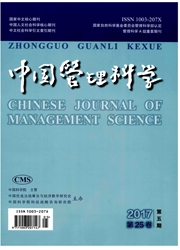

 中文摘要:
中文摘要:
通胀预期问题已成为当前和下一阶段我国经济发展中必须关注的问题。本文对我国不同期限国债的名义和实际收益建立了含有宏观因子和潜在因子的仿射无套利模型,从通胀补偿中分解出了通胀预期。研究认为:分解出的短期和中期通胀预期与通胀率的动态关联性较强,而长期通胀预期和通胀率的动态关联性较弱;各期限通胀预期都不是理性预期,但中期和长期预期是适应性预期;发现CPI是影响通胀预期的最重要因素,其影响效果随着期限增加而增大;存款利率对通胀预期的影响效果次之,对短期和中期预期有正向影响,且随期限增加而减小,对长期预期有负向影响,且随期限增加而增大;但M2对通胀预期的影响并不显著;短期和中期通胀预期的事前和事后预测能力都优于央行调查预期。
 英文摘要:
英文摘要:
Market inflation expectations are very important for market participant and of particular interest to central banks, especially when we are experiencing the baptism of the recent subprime and financial cri- sis. Using the financial market bond yields data and macro economy data, and an affine no-arbitrage model which incorporates macro and latent factors, the nominal and real yields are modelled jointly and the infla- tion compensations are decomposed into inflation expectations and premiums. Combining a macro economic structure and a micro financial model for estimating the term structure yields the advantage of evaluating the influence of macro factors on the complete term structure and capture the accurate inflation expecta- tions. It is found that the short and medium expectations and the real inflation have strong influence each other, however the long term expectations and the real inflation have influence relatively weak each other. All term expectations are not the rational expectations, but the medium and long expectations are adaptive expectations. Further, the CPI is the most important influencing factor and its effect will increase with time. Meanwhile, the influence of the deposit rate takes the second place and it has the positive effect to short and medium expectations, and the negative effect to long expectations, but the impact of M2 is not significant. The short and medium expectations have the better predictive power of ex ante and ex post than the investigation expectations of the depositor-survey of People's Bank of China, so the method in this paper can be used as a useful supplement for obtaining inflation expectations.
 同期刊论文项目
同期刊论文项目
 同项目期刊论文
同项目期刊论文
 期刊信息
期刊信息
